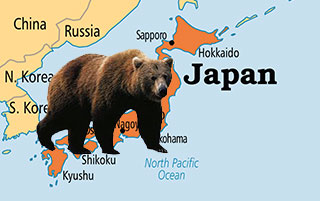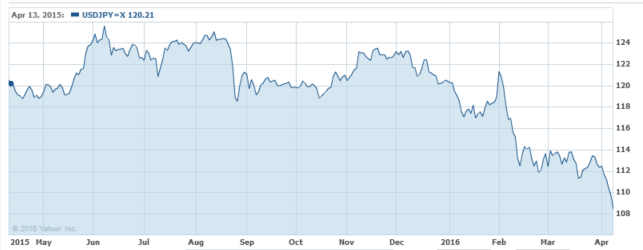The Japanese stock exchange had a good run until 2016. Since the beginning of the year, foreign investors have been pulling their funds out of the country according to reports in Bloomberg. Anyone could have conflated the downturn since the beginning of the year with the general market rout in every stock exchange that took place since the beginning of the year. However, it seems that the Japanese economy is heading for another round of stagnation after a brief respite.
Data from Japan
According to the OECD, Japan currently holds a negative interest rate of -0.1%, with projected GDP growth rate of 0.5%. Additionally, the inflation rate in Japan is around 0.3%, and experts say the country is dangerously close to hitting deflation. This means that despite the best efforts of the government to stimulate the economy through negative interest rates, fiscal expansion and a series of structural reforms, success is out of sight.
The Yen
The Yen has also been strengthening of late, which could hurt the export oriented Japanese economy even more. After hovering close to 125 towards the middle of 2015, the USD is now trading below 108 Yen now. This means that Japanese exports are getting more expensive, which could hurt the profits of some of the leading companies that are listed in the Tokyo exchange.
The USD:JPY 1 year chart, courtesy of Yahoo Finance
The strengthening of the Yen has taken place under unusual circumstances. Monetary policy divergence between the US and Japan should have allowed for the Yen to weaken even further. With negative rates in Japan and the Bank of Japan’s intent on monetary expansion, given that the Fed is raising interest rates on the greenback, it is clear that there are forces that are having a heavier influence on the Yen. Perhaps the Japanese government’s fiscal expansion is taking its toll on the Yen, given that generally increasing government expenditure raises the demand for the local currency – in this case the Yen – thus putting an upward pressure on its price.
Going Forward
Investors should be looking closely at the data from Japan in the following weeks and they should consider a bearish position on Japanese assets. The Yen may have a little more room for appreciation in the short term, however investors should be vigilant. Any drop in exports, or any further Fed rate hikes may cause the Yen to depreciate. This is why the fundamental analysis should be followed by a thorough technical analysis, while always keeping an eye on what the Fed, the BOJ and the Japanese government are planning.




